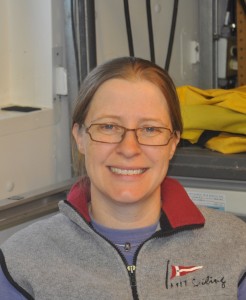Name & Institution:
Dr. Sarah Webster
Senior Engineer
Applied Physics Laboratory, University of Washington
Academic background:
- 4 years working in the Deep Submergence Lab at WHOI on remotely operated vehicles (ROVs)
- PhD In Mechanical Engineering (Robotics) from Johns Hopkins University working on single-beacon one-way-travel-time navigation
- 1.5 years as a Systems Engineer at the program management office for the Ocean Observatory Inititiative (OOI) postdoc with Dr. Craig Lee and Dr. Jason Gobat at APL-UW working on under-ice glider navigation currently one year into in a permanent research position at APL-UW
Current area of interest:
My general area of interest is underwater robotics. I’m particularly interested in glider navigation because of the challenge of the sparsity of navigation data that we have to work with, and developing algorithms that can take the place of the human pilot for auto-tuning.
Why did you sign up for this cruise?
I signed up for this cruise because I was really interested in two aspect of being a chief scientists — going through the process of prepping a glider “from scratch”, getting it tested, to the ship and deployed (and home again!). I was also really interested in the logistics side of being a chief scientists — learning about all of the pieces of being a chief scientists outside of the deployment and recovery of vehicles.
What did you learn?
Situational awareness! During the somewhat frantic scramble to get vehicles ready for deployment on the first morning of the cruise, it was too easy to get entirely focused on vehicle prep and forget to independently assess the weather conditions. A tough deployment just prior to mine reminded me to take a step away from the computer screen and stand on deck for watching the ship’s movement, find out how the recent CTD cast fared, and carefully weigh the risk to the vehicle. In the end I decided not to deploy, which was a difficult decision to make in the moment, but one that I was increasingly happy with.

